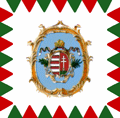 3/11/2012 - AHF commemorates Hungarian National Day and the 1848 War of Independence. The commemoration emphasized Hungary's revered history of standing up for freedom and liberty against great odds, including in 1848 – 1849, and urged that this history not be defamed through political expediency. 3/11/2012 - AHF commemorates Hungarian National Day and the 1848 War of Independence. The commemoration emphasized Hungary's revered history of standing up for freedom and liberty against great odds, including in 1848 – 1849, and urged that this history not be defamed through political expediency.
The 1848 Hungarian Revolution, under its leader Louis Kossuth sought to throw off the Austrian Yoke. It failed after Russian intervention, but its impact on the United States is felt even today. The annual commemoration of 1848, organized by the Washington, D.C. Chapter of the American Hungarian Federation was held this year on March 11th at the American University Kay Spiritual Center. Similar events were held across the country.
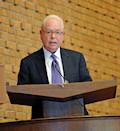 Each year, speakers focus on the significance of the 1848 revolution and how its ideals and goals relate to today's Hungary. Zoltán Bagdy, AHF Co-President and Chair of its Cultural Affairs Committee, welcomed guests and served as Master of Ceremonies. Bryan Dawson, AHF Executive Chairman, sang the national anthems of the United States and Hungary and would later deliver the Keynote Address (Ünnepi Beszéd). Each year, speakers focus on the significance of the 1848 revolution and how its ideals and goals relate to today's Hungary. Zoltán Bagdy, AHF Co-President and Chair of its Cultural Affairs Committee, welcomed guests and served as Master of Ceremonies. Bryan Dawson, AHF Executive Chairman, sang the national anthems of the United States and Hungary and would later deliver the Keynote Address (Ünnepi Beszéd).
 Andras Bacsi-Nagy, Deputy Chief of Mission, represented the Hungarian Embassy. In his Welcome Address, Mr. Bacsi-Nagy
compared the transformational events of 1848 and 1956 with today. He recalled the Russian intervention in both conflicts and Hungary's repeated hope for US support. The changes taking place today in Hungary are profound, he noted, deserving of American support from both sides of the aisle. He added that the current government's economic and social platforms are compatible with US Democratic and Republican visions respectively: Andras Bacsi-Nagy, Deputy Chief of Mission, represented the Hungarian Embassy. In his Welcome Address, Mr. Bacsi-Nagy
compared the transformational events of 1848 and 1956 with today. He recalled the Russian intervention in both conflicts and Hungary's repeated hope for US support. The changes taking place today in Hungary are profound, he noted, deserving of American support from both sides of the aisle. He added that the current government's economic and social platforms are compatible with US Democratic and Republican visions respectively:
"Magyarország ma ’48-hoz és ’56-hoz hasonló, történelmét hosszú távon meghatározó időszakot él át. A változás igénye ma nem kisebb, mint ’48-ban és ’56-ban. Mélyreható, érdemi döntések születnek, amihez joggal várnánk el – ismét – Amerika támogatását. Nem pártos kérdésről van szó. Obama elnök gazdasági programja épp annyira kompatibilis a magyar kormány törekvéseivel, mint a republikánusok társadalmi víziója." [tovább]
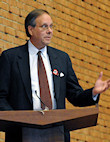 AHF President Frank Koszorus, Jr., delivered his annual "Reflections" address which this year focused on Kossuth's affect on the relationship between Hungary and the United States, the need to protect Hungary's international reputation, and the extreme negative affects on that reputation when poltical motivations outweigh honest debate. AHF President Frank Koszorus, Jr., delivered his annual "Reflections" address which this year focused on Kossuth's affect on the relationship between Hungary and the United States, the need to protect Hungary's international reputation, and the extreme negative affects on that reputation when poltical motivations outweigh honest debate.
He commented:
"Regardless of our individual political preferences or perspectives on Hungary, we can all agree, I believe, that we should call for objectivity and evenhandedness bereft of partisan politics when judgments are made about Hungary. This should not be a liberal or conservative issue – it is a question of accuracy and fundamental fairness. Hungary has a revered history of standing up for freedom and liberty against great odds, including in 1848 – 1849, and it is not to be defamed through political expediency. It is this history that we commemorate today and wish to preserve as part of the permanent legacy left in the wake of Kossuth’s trip to the United States." [download Frank's speech]
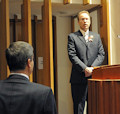 Bryan Dawson, AHF Executive Chairman, Committee delivered the 2012 Keynote Address entitled, "Novus Scotus Viator: A Case for a Kossuth-style Worldview in 2012." [download Bryan's speech (English and Hungarian)]. Bryan Dawson, AHF Executive Chairman, Committee delivered the 2012 Keynote Address entitled, "Novus Scotus Viator: A Case for a Kossuth-style Worldview in 2012." [download Bryan's speech (English and Hungarian)].
He reflected on how Kossuth's worldview enabled him to not only recognize the impact of external forces on Hungarian sovereignty, but guided his strategy. Kossuth's remarkable eloquence, sophistication and statesmanship not only gained friends and allies (his impact was particularly strong in United States), it significantly enhanced Hungary's international reputation. Bryan added that the eventual decline of that reputation and the Hungarian leadership's inability to deal effectively with external anti-Hungarians forces would leqad to the unthinkable: the dismemberment of Hungary. Bryan said:
"Kossuth understood the impact on external forces to Hungarian aspirations for sovereignty and independence. This broad worldview would guide his governance and strategy. As external forces continue their subtle and often overt attacks on Hungary, it is Kossuth’s sophisticated worldview we need today."
"Kossuth knew that an independent Hungary, a republic in the days of emperors in the heart of Europe, would be perceived as a challenge to the balance of power in Europe which had undergone tremendous upheaval. The Congress of Vienna in 1815 sought to deal with the after effects of the Napoleonic Wars, the French Revolutionary Wars, and the disintegration of the Holy Roman Empire, which had lasted almost 850 years. Borders were redrawn and the European powers, many of whom emerged from 25 years of constant warfare, were obsessed with establishing and maintaining a new balance of power. Britain, for example, saw survival of the Austrian Empire as key to this strategy. An independent Hungary could result in the break-up of the Austrian Empire and tip the balance of power. Kossuth understood this.
The 1848 War of Independence crushed, he still sought ways to throw off the Austrian yoke and envisioned a new order to replace the Habsburgs: A Danubian Confederation. He intended to accommodate the forces of nationalism within the Danubian basin while preserving Hungary's territorial integrity and replacing Austria's position in the European balance of power."
Bryan discussed the rise of nationalism in the late 1800's through early 1900's and the role of external forces, who now saw Hungary as a threat and manipulated ethnic tensions to Hungary's detriment. He compared the efforts of Robert Seton-Watson, writing under his pen name "Scotus Viator," who, along with Henry Wickham Steed as part of official British policy, greatly influenced negative attitudes toward Hungary, to today's baseless attacks. He feels Hungary did not react well to these external forces and added that history seems to be repeating itself today with a new cadre of Scotus Viators against which there seems no effective strategy.
"Yes, Hungary is still under attack –Scotus Viator is alive and well. While the EU and media ignore the gross violations of human rights and dignity and anti-Hungarian pogroms across the Carpathian Basin, these same entities sue Hungary over inane internal policies such as the lowering of judge retirement age. As we saw with Scotus Viator, the media reprints baseless criticisms as fact. The new set of “Scotus Viators” recently accused Hungary of banning international media outlets, such as CNN, who informed the Federation that this allegation was false."
Bryan had opened his speech quoting Benjamin Franklin and Friedrich Nietsche:
"Benjamin Franklin wrote that “he who lives upon hope will die fasting.” Friedrich Nietzsche would later write, “Hope, in reality, is the worst of all evils because it prolongs the torments of man.”
Bryan also discussed the promise of 1989, when Hungary finally was freed from communist rule, and the challenges Hungary faces in rebuilding a nation divided and bankrupted. Entire generations of Hungarians lived under a communist regime whose interest was to stifle Hungarians' deep sense of pride and patriotism:
"Hungary remains divided with entire generations who could care less about their civic duty, their history, or their brothers on the other side of the border."
While the EU and media harshly criticize Hungary for lowering judge retirement age, an internal policy decision, they ignore egregious attacks on human and minority rights. He closed the speech referring back to Franklin and Nietsche and reminding us that hope alone is not a strategy and cannot bring change. We need hard work and Kossuthesque eloquence and "solidity of action."
"Here we are in 2012 remembering Kossuth and his moral acts. What would Kossuth do today? What will we do? We mustn’t live in hope as many will die fasting. We mustn’t quit. We must work in unity to bring about change lest we capitulate to Nietzsche and prolong the torment of our nation."
Bryan urged the community to unite on common ground issues and to continue to support the Federation and its work:
"The issues we raise are common ground issues. They are not left vs. right, liberal vs. conservative. Human and minority rights are simply a question of right vs. wrong."
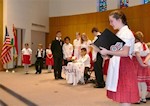 Members of the the The 4th Bátori József Hungarian Scouts Troop of Washington, DC seen here (photo courtesty of MTI Pogár Demeter), provided a major part of the program which included a poetic re-enactment of the beginnings of the 1848 Revolution, including Hargitai Adam who recited Petőfi Sándor's Nemzeti Dal. Members of the the The 4th Bátori József Hungarian Scouts Troop of Washington, DC seen here (photo courtesty of MTI Pogár Demeter), provided a major part of the program which included a poetic re-enactment of the beginnings of the 1848 Revolution, including Hargitai Adam who recited Petőfi Sándor's Nemzeti Dal.
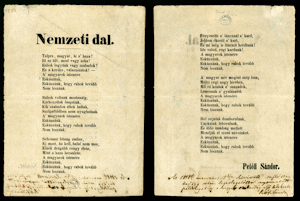 The Scouts then led the audience in the patriotic Kosuth Dalok (Kossuth Songs). The Revs. Peter Pal Cegledi and Judit Mayer of the Hungarian Reformed Church of Washington, D.C., provided the benediction and closing remarks respectively - Bryan Dawson. The Scouts then led the audience in the patriotic Kosuth Dalok (Kossuth Songs). The Revs. Peter Pal Cegledi and Judit Mayer of the Hungarian Reformed Church of Washington, D.C., provided the benediction and closing remarks respectively - Bryan Dawson.
Photos below are of the 2011 Ceremony courtesy of Dr. Imre Nemeth.
 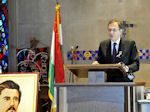 
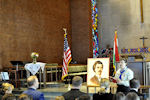 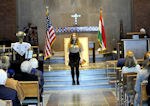 
  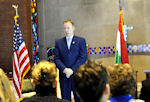
  
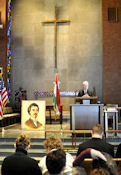 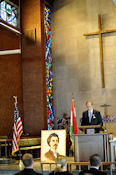
Join and Support us online!

[back to all 1848 news]
[<< Back to All AHF News]
|
[ < back to AHF 1848 Commemorations ]
News, Articles and Speeches from other 2012 Commemorations:
- Budapest, Hungary
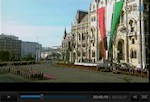 Ünnepélyes zászlófelvonás a Kossuth téren, 2012. március 15 (magyarul / Hungarian Television programming) [tovább] Ünnepélyes zászlófelvonás a Kossuth téren, 2012. március 15 (magyarul / Hungarian Television programming) [tovább]
- Australia (Tasmania)
Attila J. Ürményházi on the Occasion of the 2012 Commemoration of the 1848-1849 Hungarian War of Independence
Hobart, 2012 március 18
[tovább magyarul]
Shortcuts:
Downloads:
Famous Quotes
 "the house of Habsburg-Lorraine, perjured in the sight of
God and man, had forfeited the Hungarian throne." "the house of Habsburg-Lorraine, perjured in the sight of
God and man, had forfeited the Hungarian throne."
Hungary, April 1849
"All for the people and all by the people. Nothing about
the people without the people. That is Democracy, and that is the ruling
tendency of the spirit of our age."
Spoken before the Ohio State Legislature,
February 16, 1852
About Louis
Kossuth
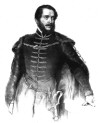 Kossuth
Lajos (b. 1802, d. 1894, pronounced co-shoot luh-yôsh) was Governor of Hungary during fight for independence and democracy which
was eventually defeated by the union of the royalist Austrian Habsburg
and Russian Czarist Armies (1848 - 1849). Kossuth envisioned a federation
in the Kingdom of Hungary in which all nationalties participated in a
vibrant democratic system based on fundamental democratic principles such
as equality and parliamentary representation. The bloody conflict eventually
led to a great compromise known as the "Austro-Hungarian Empire,"
in which Hungary gained some autonomy. although Kossuth would have no
part in it and demanded full indepependence until his death. Kossuth
Lajos (b. 1802, d. 1894, pronounced co-shoot luh-yôsh) was Governor of Hungary during fight for independence and democracy which
was eventually defeated by the union of the royalist Austrian Habsburg
and Russian Czarist Armies (1848 - 1849). Kossuth envisioned a federation
in the Kingdom of Hungary in which all nationalties participated in a
vibrant democratic system based on fundamental democratic principles such
as equality and parliamentary representation. The bloody conflict eventually
led to a great compromise known as the "Austro-Hungarian Empire,"
in which Hungary gained some autonomy. although Kossuth would have no
part in it and demanded full indepependence until his death.
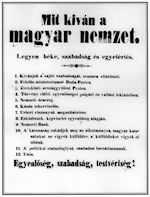 The speech from which the above excerpt is taken was given over a decade
before Lincoln's famed "for the people, by the people" speech
given at Gettysburg in 1863. Kossuth was the first foreign Statesman officially
invited to the US since the Marquis de Lafayette. His upcoming speech
in the Congress of the United States made the pre-civil war joint house
nervous due to his democratic views on equality of all men. Kossuth learned
English while in prison and exile and spoke to half the population of
the US who enthusiastically greeted and flocked to hear him. Despite Hungary's
epic struggle and Kossuth's brave and noble efforts, the US, the "Bastion
of Democracy" turned him away, empty handed. Hungary was alone again
in its fight for democracy in 1956, and didn't gain freedom until 1989 and would soon join NATO. The speech from which the above excerpt is taken was given over a decade
before Lincoln's famed "for the people, by the people" speech
given at Gettysburg in 1863. Kossuth was the first foreign Statesman officially
invited to the US since the Marquis de Lafayette. His upcoming speech
in the Congress of the United States made the pre-civil war joint house
nervous due to his democratic views on equality of all men. Kossuth learned
English while in prison and exile and spoke to half the population of
the US who enthusiastically greeted and flocked to hear him. Despite Hungary's
epic struggle and Kossuth's brave and noble efforts, the US, the "Bastion
of Democracy" turned him away, empty handed. Hungary was alone again
in its fight for democracy in 1956, and didn't gain freedom until 1989 and would soon join NATO.
Today, there are many reminders of Kossuth's impact on America and the
world. In North America, there is a Kossuth County in the state of Iowa,
a town with his name in Indiana, Ohio and Mississippi,
a settlement with a Kossuth Post Office is in Pennsylvania. In addition,
there are Kossuth statues and plaques in New York, Cleveland, Akron, New
Orleans, Washington, and Ontario, Canada. The Hungarian
Reformed Federation's building on Dupont Circle, in Washington, DC
is called Kossuth House with a memorial plaque commemorating his speech
on democracy. See the picture gallery and memorials on Louis
Kossuth in North America.
The renowned Ralph Waldo Emerson said in greeting Kossuth on his arrival
at Concord, MA, May 11, 1852:
"[we] have been hungry to see the man whose extraordinary eloquence
is seconded by the splendor and the solidity of his actions."
Kossuth was greeted with wild enthusiasm across the country. He was only
the second foreign leader (second to Lafayette) to address a joint session
of Congress. The American Hungarian Federation dedicated a bust that now sits proudly in the US Capitol - it reads, "Louis
Kossuth, Father of Hungarian Democracy" [read more]
Audio
Resources
 Hear
Louis Kossuth Speak! [Click Here] - This is the speech of Louis Kossuth which he gave for the dedication of the statue for the 13 Hungarian generals, who were executed at Arad, Hungary, on October 6, 1849 (Arad is in Rumania today after annexation due to the Treaty of Trianon in 1920 ).
Louis Kossuth was exiled after the fall of the Hungarian Liberation Fight of 1848 and made his permanent home in Torino (Turin), Italy. He could not attend the dedication of the monument at Arad, without risking arrest, so he recorded his speech inTurin, and sent it to Arad using the new technology of sound recording, called the phonograph. Hear
Louis Kossuth Speak! [Click Here] - This is the speech of Louis Kossuth which he gave for the dedication of the statue for the 13 Hungarian generals, who were executed at Arad, Hungary, on October 6, 1849 (Arad is in Rumania today after annexation due to the Treaty of Trianon in 1920 ).
Louis Kossuth was exiled after the fall of the Hungarian Liberation Fight of 1848 and made his permanent home in Torino (Turin), Italy. He could not attend the dedication of the monument at Arad, without risking arrest, so he recorded his speech inTurin, and sent it to Arad using the new technology of sound recording, called the phonograph.
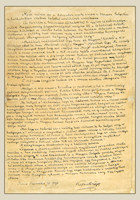 The recording was made on September 20, 1890, when Kossuth was 88 years old. It is a sad fact that the monument Kossuth sent his speech for was torn down by the Rumanian government when they annexed Transylvania, along with Arad, in 1920, after World War I. The recording was made on September 20, 1890, when Kossuth was 88 years old. It is a sad fact that the monument Kossuth sent his speech for was torn down by the Rumanian government when they annexed Transylvania, along with Arad, in 1920, after World War I.
The original
recording on two wax cylinders for the Edison phonograph survives to this
day, although barely audible due to excess playback and unsuccessful early
restoration attempts. Lajos Kossuth is the earliest born person
in the world who has his voice preserved. Since the audio
is of such poor quality, here is it is transcribed in Hungarian and translated
to English (special thanks to Louis
Kossuth in North America)
Hungarian |
English |
"A világ bírája
a történelem fog e kérdésre felelni. Legyenek
a szentemlékû vértanúk megáldottak
poraikban, szellemeikben a hon szabadság Istenének
legjobb áldásaival az örökkévalóságon
keresztül; engem ki nem borulhatok le a Magyar Golgota porába,
engem október 6-a térdeimre borulva fog hontalanságom
remete lakában látni a mint az engem kitagadott Haza
felé nyújtva agg karjaimat a hála hû
érzelmeivel áldom a vértanúk szent emlékét
hûségükért a Haza iránt, 's a magasztos
példáért, melyet az utódoknak adtanak;
's buzgó imával kérem a magyarok Istenét,
hogy tegye diadalmassá a velõkig ható szózatot,
mely Hungária ajkairól a Magyar Nemzethez zeng. Úgy
legyen Ámen!
Turin
September 20 1890
Kossuth Lajos |
"The judge of the universe,
history, will decide over this question. Should the saintly remembered
martyrs be hallowed in their ashes, in their spirit with the highest
blessings of the Lord of Liberty and through eternity; I can not
pay my sympathies to the ashes of the Hungarian Golgotha, but October
6 will find me on my knees in this reclusive home of exile, as I
open my arms to my disowning homeland. With gratitude's faithful
sentiments, I bless the martyrs' sacred memory for their faith in
their homeland and for the sublime example they left to their heirs:
with ardent prayer I beg the God of Hungarians to make their appeal
which echoes from the lips of Hungaria to the Hungarian Nation.
So be it, Amen!
Turin
September 20 1890
Lajos Kossuth |
|
Click to hear the recording: |
"Kossuth Lajos azt üzente,
elfogyott a regimentje.
Ha még egyszer azt üzeni,
mindnyájunknak el kell menni,
Éljen a magyar szabadság,
Éljen a haza ! |
Esik esõ karikára,
Kossuth Lajos kalapjára.
Valahány csepp esik rája,
Annyi áldás szálljon rája,
Éljen a magyar szabadság,
Éljen a haza!" |
Links
- AHF and the Kossuth Bust in the US Capitol
- AHF commemorating 1848
- President Bush Honors 1848 and Hungary's Contributions to Democracy
- HRFA's excellent Kossuth in America [visit]
- Select Speeches of Kossuth, Condensed and Abridged, with Kossuth's
Express Sanction [visit]
- Louis Kossuth, Mason And Apostle Of World Democracy [visit]
- Count Apponyi's Oration on the Death of Louis Kossuth [visit]
- Wikipedia - [visit]
and add your thoughts!
- Louis Kossuth in North America [visit]
- Kossuth County, Iowa [visit]
- Kossuth County, Iowa statue dedication
[visit]
- Dedication of statue to replace one destroyed by
Rumanian occupation
forces in 1921:
Gyergyócsomafalva, Transylvania [visit]
|



